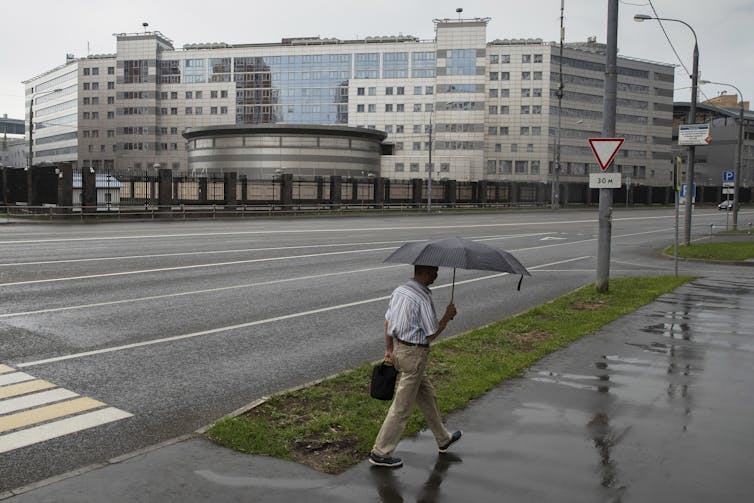Autocracies that look like democracies are a threat across the globe
- Written by Richard Carney, Professor, China Europe International Business School
Russia’s successful interference[1] in the 2016 U.S. presidential election may inspire other countries to do the same.
These other countries don’t look threatening. They look like democracies. But they’re not.
They’re a special kind of autocratic regime that masquerades as a democracy. And what looks like benevolent conduct by these countries can quickly change into aggressive, politically charged behavior.
Autocracies, often known as “authoritarian regimes,” maintain power through centralized control over information and resources. Political opposition is either forbidden or strongly curtailed and individual freedom is limited by the state.
Autocracies that look like democracies are different because their leaders permit political opponents to run for election – even though they rarely win.
These countries’ capitalist systems have some of the trappings of liberal democracies in the West. But these regimes use capitalism to further their authoritarian rule.
These so-called “dominant party authoritarian regimes” have surged in number from around 13 percent of all countries before the end of the Cold War to around 33 percent today[2].
Most are located in Africa, the Middle East and Asia. They are also present in Eastern Europe and in the Americas. Russia is one of them; so are Turkey, Malaysia, Singapore and Venezuela.
These regimes often engage in the same kinds of bad behavior as other autocracies. But their behavior is critically different in both the motivations and methods used to further authoritarian ends, as detailed in my new book “Authoritarian Capitalism[3].”
 The Russian military intelligence service building; 12 of its officers hacked into the Clinton presidential campaign.
AP/Pavel Golovkin[4]
The Russian military intelligence service building; 12 of its officers hacked into the Clinton presidential campaign.
AP/Pavel Golovkin[4]
Political control
Part of the danger with dominant party authoritarian regimes is that their veneer of democracy permits political opponents to run for election. But when incumbent rulers face a threat to their power, the autocrats often respond by targeting political dissidents and taking aggressive actions toward foreign enemies to bolster popular support.
For example, Russian leader Vladimir Putin faced an unprecedented challenge from citizen protests during the 2012 presidential election[5]. The protests continued into 2013.
Putin punished the protesters. New York Times correspondent Ellen Barry reported in 2013[6] that “new laws prescribe draconian punishments for acts of dissent. … Mr. Putin … embraced a new, sharply conservative rhetoric, dismissing the urban protesters as traitors and blasphemers, enemies of Russia.”
Shortly afterward, Russia’s foreign activities became even more belligerent than during the Soviet period[7]. This accomplished just what Putin wanted: Following his annexation of Crimea in 2014, his approval ratings skyrocketed[8].
Another recent example is Turkish leader Recep Tayyip Erdogan’s repression of domestic political dissidents[9] following the failed July 2016 coup against him. According to The Guardian, the regime arrested or suspended “more than 110,000 officials, including judges, teachers, police and civil servants.”
Erdogan went after foreign-based dissidents too, allegedly orchestrating a plot to kidnap opposition leader Fetullah Gulen[10] from Pennsylvania.
And while he won the presidential election in June 2018, Erdogan’s foreign-based critics remain concerned about his threats. Enes Kanter[11], a Turkish NBA star, declined to travel to London in January 2019 out of fear that Turkish spies might kill him.
 Turkish NBA star Enes Kanter curtails foreign travel for fear of kidnapping by the Turkish government.
AP/Kathy Willens[12]
Turkish NBA star Enes Kanter curtails foreign travel for fear of kidnapping by the Turkish government.
AP/Kathy Willens[12]
Information control
Another distinction that characterizes dominant party authoritarian regimes is how they exploit Western legal and financial systems against Western media outlets critical of the regime.
Normally, autocrats control information and resources[13] to retain power. But rather than relying on the typical autocrat’s crude hostile attacks or outright censorship, dominant party authoritarian regimes use legal or financial methods regarded as legitimate by the West.
In other words, they sue the media or they buy them.
A slew of foreign news organizations – including The New York Times[14], Wall Street Journal[15], Bloomberg[16] and The Economist[17] – were sued by the Lee family, autocratic rulers of Singapore, for political and financial reporting after the 2008 global financial crisis.
The family maintained the coverage defamed them. As the Wall Street Journal’s editors wrote in 2008[18], “We know of no foreign publication that has ever won in a Singapore court of law. Virtually every Western publication that circulates in the city-state has faced a lawsuit, or the threat of one.”
Malaysian political authorities deployed similar tactics when their rulers felt threatened.
Following the Asian financial crisis of 1997, and in the months leading up to the November 1999 general election, wealthy ruling party supporters in Malaysia filed a flurry of defamation lawsuits[19] against foreign journalists and media organizations, such as the Asian Wall Street Journal and Dow Jones.
Russia’s means of pressuring foreign media are slightly different, but they also involve taking advantage of Western legal-financial systems.
Russia has engaged in disinformation campaigns[20] that exploit weaknesses in the West’s freedom of speech protections, as documented by experts at the Center for Strategic and International Studies and at the Center for the Study of Democracy.
And Russian companies have acquired sufficiently large ownership stakes[21] in foreign media companies to influence their operations.
This has involved both the manipulation of their coverage and a reduction in media freedoms of the country in which they are located.
For example, Delyan Peevski[22] is a controversial member of the Bulgarian Parliament who advocated for pro-Russian policies. Peevski built and sustained a media empire that controls around 40 percent of Bulgaria’s print sector and 80 percent of the newspaper distribution with loans from a partially Russian-owned bank.
 Delyan Peevski, right, the Russian-backed Bulgarian media mogul and politician.
REUTERS/Petko Nalbantov/BGNES[23]
Delyan Peevski, right, the Russian-backed Bulgarian media mogul and politician.
REUTERS/Petko Nalbantov/BGNES[23]
Resource control
In contrast to firms located in other types of autocracies, state-controlled businesses in dominant party authoritarian regimes often comply with international financial regulations. This helps them gain access to Western countries’ corporate and financial systems.
Under cover of legitimate business operations, their autocratic leaders can pursue political objectives with less scrutiny.
Malaysia’s state-owned investment fund, 1MDB[24], engaged in aggressive investment tactics[25] with corrupt practices – including “abnormally high payback” for investment bankers – that extended across the globe.
The U.S. accuses former Prime Minister Najib Razak’s family friend[26] of masterminding the theft of US$2 billion from the fund. And its capital was also channeled to politicians and projects[27] to help the ruling party win the 2013 elections.
Russia has also used state-linked companies[28] to gain influence over Hungary, Serbia and Bulgaria’s crucial energy sectors via purchases of ownership stakes in listed companies.
This granted the Russian state access to other key sectors of these economies, such as finance and telecommunications. Russia then was able to influence government policies[29].
In one case, the Serbian government chose not to enforce the European Union’s sanctions against Russia[30]. That was a risk for Serbia, because it has wanted to qualify for European Union membership by 2025.
Even bolder actions occurred with Russia’s interference in the U.S. 2016 presidential election.
Michael McFaul, the former U.S. ambassador to Russia, told the Senate in September 2018 that never before had the Kremlin violated American sovereignty so “illegally, aggressively and audaciously”[31] – even during the high-stakes rivalry of the Cold War.
It is now common knowledge that Russian-controlled agencies and businesses[32] played a strategically vital role in the election interference.
Resisting influence
Can democracies defend themselves against such aggressive regimes?
The “Kremlin Playbook[33],” written by Heather A. Conley, James Mina, Ruslan Stefanov and Martin Vladimirov, is an extensive study of Russian influence in Hungary, Slovakia, Bulgaria, Latvia and Serbia. It provides a detailed list of policy recommendations to resist Russian influence that can be applied to other dominant party authoritarian regimes.
They include strengthening intelligence gathering and cooperation between the U.S. and its allies; increasing U.S. and allied governments’ assistance to vulnerable countries; and stronger protections for and enforcement of transparency measures.
But I believe an important addition to this list is the need to monitor the strength of the ruling party’s hold on power. That’s because aggressive, politically charged activities are most likely to occur when incumbent rulers face an elevated threat.
With its attack on the U.S. 2016 election, Russia showed that it’s possible to interfere destructively in the most powerful Western democracy. I expect that other autocracies that look like democracies will follow suit – across the globe.
References
- ^ Russia’s successful interference (www.nytimes.com)
- ^ 33 percent today (doi.org)
- ^ Authoritarian Capitalism (doi.org)
- ^ AP/Pavel Golovkin (www.apimages.com)
- ^ citizen protests during the 2012 presidential election (en.wikipedia.org)
- ^ Ellen Barry reported in 2013 (www.nytimes.com)
- ^ belligerent than during the Soviet period (www.banking.senate.gov)
- ^ skyrocketed (www.washingtonpost.com)
- ^ domestic political dissidents (www.theguardian.com)
- ^ Fetullah Gulen (www.newsweek.com)
- ^ Enes Kanter (www.nytimes.com)
- ^ AP/Kathy Willens (www.apimages.com)
- ^ autocrats control information and resources (oxfordre.com)
- ^ The New York Times (www.nytimes.com)
- ^ Wall Street Journal (www.wsj.com)
- ^ Bloomberg (www.nytimes.com)
- ^ The Economist (www.nytimes.com)
- ^ editors wrote in 2008 (www.wsj.com)
- ^ defamation lawsuits (www.ipsnews.net)
- ^ disinformation campaigns (www.csis.org)
- ^ ownership stakes (www.csis.org)
- ^ Delyan Peevski (www.csis.org)
- ^ REUTERS/Petko Nalbantov/BGNES (pictures.reuters.com)
- ^ 1MDB (www.theguardian.com)
- ^ aggressive investment tactics (www.theedgemarkets.com)
- ^ family friend (www.theguardian.com)
- ^ channeled to politicians and projects (www.cnbc.com)
- ^ state-linked companies (www.csis.org)
- ^ Russia then was able to influence government policies (www.csis.org)
- ^ chose not to enforce the European Union’s sanctions against Russia (www.ft.com)
- ^ “illegally, aggressively and audaciously” (www.banking.senate.gov)
- ^ Russian-controlled agencies and businesses (www.justice.gov)
- ^ Kremlin Playbook (www.csis.org)
Authors: Richard Carney, Professor, China Europe International Business School

